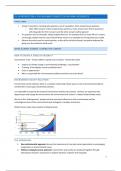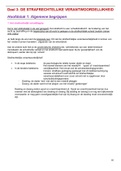S1: INTRODUCTION + THE ASSUMED SCARCITY OF NATURAL RESOURCES
FINAL EXAM
• Answer 4 questions, including sub-questions, out of a possible 5 short answer/essay questions
o Note: ONLY answer 4 short answer/essay questions, if you answer more than 4 questions, I
will only grade the first 4 answers and the other answers will be ignored
• If a question asks for examples, always explain them (so: ‘an example of this is South Africa’ is clearly
not enough; explain how the case of South Africa serves as an example for the argument you made).
• Observe the word count for each question, as this will be strictly enforced, and points deducted for
going over the maximum word count.
INTRO CLIMATE CHANGE + SAVING THE CLIMATE
HOW TO CREATE A SENSE OF URGENCY?
Inconvenient Truth – Al Gore 2006 vs Capital versus Climate – Naomi Klein 2015
• Urgency of climate change / environmental challenges: ‘securitization’
• ‘Framing’ of the debate: moral or political issue?
• Crisis or opportunity?
• Who is responsible for environmental problems and who may solve them?
ENVIRONMENT-SOCIETY RELATIONS
Environment-society relations which is a complex relationship: Many ways to view environmental problems,
and therefore many types of potential solutions.
It is impossible to separate the (natural) environment and (human) society: Humans are organisms that
depend upon and change the environment; the environment and ‘nature’ is always fundamentally social.
We live in the ‘Anthropocene’: people exercise enormous influence on their environment and the
control/governance of the environments (and ecologies) is complex and elusive.
Global human-made mass exceeds all living biomass.
THE APPROACHES
1. Neo-institutionalist approach stresses the importance of rules and social organization in encouraging
cooperation on environmental issues.
2. Political ecology/economy approach: environment and society are produced together through
interactions of power. Importance to explore dynamics of power and inequality.
1
, 3. Social constructivist approach: explore the ‘making’ of nature and the construction of knowledge on
the environment/natural resources.
4. Feminism: stresses the enforced inequality between individuals of different genders and explores how
both nature and women are exploited by masculinist values.
5. Environmental racism: highlights the role of race in the disproportionate exposure of minority
populations to environmental and public health hazards.
Awareness of the ethical dilemmas involved in resources management.
DEFINITIONS
NATURAL RESOURCES
All the land, forests, energy sources and minerals existing naturally in a place that can be used by people
(Collins dictionary)
CONFLICT
a serious disagreement or argument about something important; typically protracted in nature (Collins
dictionary) NOT WAR in this course.
GOVERNANCE
The ways in which society makes decisions regarding collective problems, thereby creating norms, rules, and
institutions (Hufty 2011); Not exclusively the domain of government; other formal or informal organizations
and leaders can also govern.
THE ASSUMED ‘SCARCITY’ OF NATURAL RESOURCES
A lot of older population (65+), where that was in 1950 the smallest part
of the population.
Population & scarcity: Perspectives:
1. Malthusian perspective
2. Neo-Malthusianism
Alternative perspectives:
1. Population as resource for innovation (e.g., 'Green revolution')
2. Development helps decline population growth.
1. MALTHUSIAN PERSPECTIVE
If population grows exponentially and resources grow linearly, people will outgrow their food supply. Disease,
famine, and war are natural corrections to rapid population growth.
Welfare programs facilitate population growth among the poor and
therefore exacerbate resource scarcity. Moral restraint (by women) is
necessary to maintain sustainable population levels.
Critics:
1. Resource deterministic
2
, 2. Argument removes blame from political and economic systems, the wealthy, and men to poor and
women.
a. For example, he ignores the fact that wealthy people do use more resources.
2. NEO-MALTHUSIANISM
Population is the factor that has the greatest impact on the environment, but the effects of population are
mediated by differences in lifestyle:
Impact = Population * Affluence * Technology (Ehrlich and Holdren 1974)
Affluence = consumption; per capita GDP
Critiques:
1. Development has varying impacts on the environment: development initially has great impact on the
environment, but once a threshold of affluence is reached, economic transition and regulations lead
to a decrease in environmental impacts.
2. What are sustainable limits? How much is too much? -> culturally defined.
Example: The ecological footprints. It has its problems, but it can show how you can have an impact.
3. ALTERNATIVES TO (NEO-)MALTHUSIAN PERSPECTIVES:
Alternatives to (neo-)Malthusian perspectives:
1. Population as a resource for innovation, rather than as a problem
2. Instead of population growth limiting development, population growth is the result of under-
development, while development helps decrease population growth rates.
1. POPULATION AS A RESOURCE FOR INNOVATION, RATHER THAN AS A PROBLEM
Population as a resource for innovation, rather than as a problem
• When resources are scarce, people will innovate (e.g., EsterBoserup,1965)
• More people mean more brains and hands working to solve problems.
Critiques: ‘costs of the Green revolution’
• Green revolution: a series of technological advancements and agricultural innovations implemented
during the mid-20th century that significantly increased global food production, particularly in
developing countries, by high-yielding crop varieties, modern farming techniques, and increased use
of fertilizers and irrigation.
• But costs: Fertilizers, loss of biodiversity, loss of ecosystem, smaller farmers are negative effected, not
all the countries are producing the food that they need…
3






